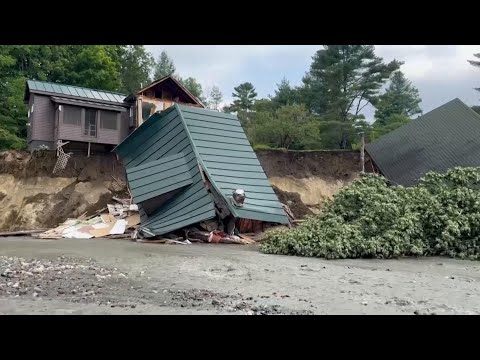(30 Jul 2024)
RESTRICTION SUMMARY:
ASSOCIATED PRESS
Lyndonville, Vermont – 30 July 2024
1. Various of a home destroyed by floods
ASSOCIATED PRESS
Burlington, Vermont – 30 July 2024
2. SOUNDBITE (English) Peter Banacos, Meteorologist, National Weather Service:
"You know, Vermont, as you know, it’s a very mountainous state. Much of the state is comprised of complex terrain, very steeply sloped hillsides and mountainsides. And when we get heavy rainfall, the orthography is such that you’re channeling the water in certain locations down hillsides, and it’s making the runoff much worse than it would be, say, if the ground were flat."
ASSOCIATED PRESS
Lyndonville, Vermont – 30 July 2024
3. Wide of trees, utility poles and a home brought down by floods
ASSOCIATED PRESS
Burlington, Vermont – 30 July 2024
4. SOUNDBITE (English) Peter Banacos, Meteorologist, National Weather Service:
"That’s the number one thing that makes us susceptible here in Vermont, especially the flash flooding is just the nature of the complex terrain."
ASSOCIATED PRESS
Lyndonville, Vermont – 30 July 2024
5. An all-terrain vehicle drives along a damaged roadway after flooding
6. Emergency crews at work after floods washed away a roadway
ASSOCIATED PRESS
Burlington, Vermont – 30 July 2024
7. SOUNDBITE (English) Peter Banacos, Meteorologist, National Weather Service:
"There’s more moisture available in the atmosphere as the climate warms. We’re seeing higher dew points. We’re seeing, more moisture-laden air masses making it into, up to our latitude. So, you know, as a function of that, when you get thunderstorms, they can produce heavier rainfall than they would otherwise. And that’s not to say that any one event can be attributed to climate change. But in the overall aggregate, as we look at the changes, we’re seeing, rainfall annually increase across the state of Vermont. So, you know, it’s really that increase in the moisture availability that we can really wrap our heads around the easiest."
ASSOCIATED PRESS
Lyndonville, Vermont – 30 July 2024
8. Various of destruction wreaked by floods
ASSOCIATED PRESS
Burlington, Vermont – 30 July 2024
9. SOUNDBITE (English) Peter Banacos, Meteorologist, National Weather Service:
"As we see more frequent rainfall events, oftentimes when they come in rapid succession, we have soil conditions that are more moist or even saturated as the next system comes along. So, we see rainfall falling on saturated ground, and that’s going immediately into a runoff, surface runoff situation, rather than being able to percolate into the soils which would happen if the ground were drier, right? So, you almost think of it as a sponge. If the sponge is already full of water, it has no capability of absorbing more water. So, it’s just running off."
ASSOCIATED PRESS
Lyndonville, Vermont – 30 July 2024
10. An emergency worker in operation in an area hit by floods
STORYLINE:
Heavy rain has caved in roads, forced some homes off their foundations and led to about two dozen rescues in northeastern Vermont.
It happened nearly three weeks after many farmers and residents in the state were hit by flooding from the remnants of Hurricane Beryl.
The National Weather Service in Burlington says some areas got 6 to more than 8 inches of rain starting late Monday and saw flash flooding.
Flood warnings were in effect through Tuesday afternoon.
Most of the rain fell Lyndon, Lyndonville and in St. Johnsbury, about 35 miles northeast of the state capital of Montpelier. More rain is in the forecast for the region on Wednesday.
Find out more about AP Archive: http://www.aparchive.com/HowWeWork
Twitter: https://twitter.com/AP_Archive
Facebook: https://www.facebook.com/APArchives
Instagram: https://www.instagram.com/APNews/
You can license this story through AP Archive: http://www.aparchive.com/metadata/youtube/378dd61f7ead4d1e9ef0e356c7a14f14
Author: AP Archive
Go to Source
News post in August 5, 2024, 12:04 am.
Visit Our Sponsor’s:
News Post In – News





